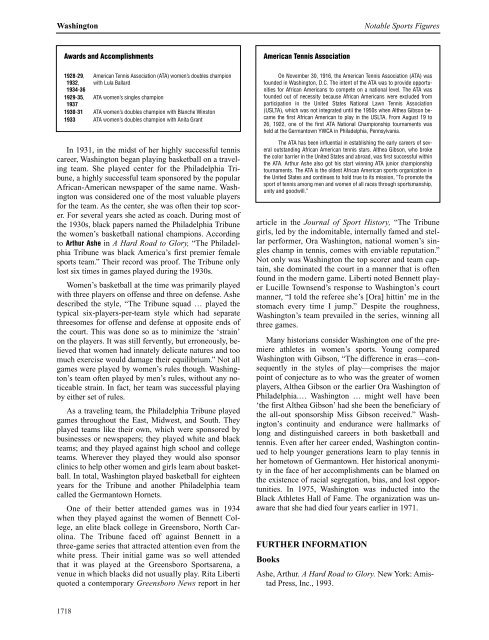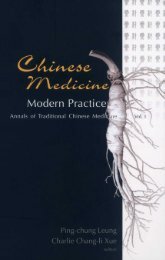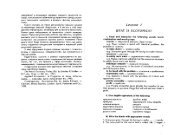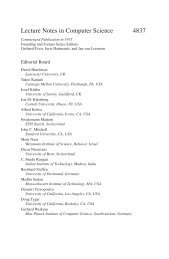Frank Thomas
Frank Thomas
Frank Thomas
You also want an ePaper? Increase the reach of your titles
YUMPU automatically turns print PDFs into web optimized ePapers that Google loves.
Washington Notable Sports Figures<br />
Awards and Accomplishments<br />
1928-29, American Tennis Association (ATA) women’s doubles champion<br />
1932, with Lula Ballard<br />
1934-36<br />
1929-35, ATA women’s singles champion<br />
1937<br />
1930-31 ATA women’s doubles champion with Blanche Winston<br />
1933 ATA women’s doubles champion with Anita Grant<br />
In 1931, in the midst of her highly successful tennis<br />
career, Washington began playing basketball on a traveling<br />
team. She played center for the Philadelphia Tribune,<br />
a highly successful team sponsored by the popular<br />
African-American newspaper of the same name. Washington<br />
was considered one of the most valuable players<br />
for the team. As the center, she was often their top scorer.<br />
For several years she acted as coach. During most of<br />
the 1930s, black papers named the Philadelphia Tribune<br />
the women’s basketball national champions. According<br />
to Arthur Ashe in A Hard Road to Glory, “The Philadelphia<br />
Tribune was black America’s first premier female<br />
sports team.” Their record was proof. The Tribune only<br />
lost six times in games played during the 1930s.<br />
Women’s basketball at the time was primarily played<br />
with three players on offense and three on defense. Ashe<br />
described the style, “The Tribune squad … played the<br />
typical six-players-per-team style which had separate<br />
threesomes for offense and defense at opposite ends of<br />
the court. This was done so as to minimize the ‘strain’<br />
on the players. It was still fervently, but erroneously, believed<br />
that women had innately delicate natures and too<br />
much exercise would damage their equilibrium.” Not all<br />
games were played by women’s rules though. Washington’s<br />
team often played by men’s rules, without any noticeable<br />
strain. In fact, her team was successful playing<br />
by either set of rules.<br />
As a traveling team, the Philadelphia Tribune played<br />
games throughout the East, Midwest, and South. They<br />
played teams like their own, which were sponsored by<br />
businesses or newspapers; they played white and black<br />
teams; and they played against high school and college<br />
teams. Wherever they played they would also sponsor<br />
clinics to help other women and girls learn about basketball.<br />
In total, Washington played basketball for eighteen<br />
years for the Tribune and another Philadelphia team<br />
called the Germantown Hornets.<br />
One of their better attended games was in 1934<br />
when they played against the women of Bennett College,<br />
an elite black college in Greensboro, North Carolina.<br />
The Tribune faced off against Bennett in a<br />
three-game series that attracted attention even from the<br />
white press. Their initial game was so well attended<br />
that it was played at the Greensboro Sportsarena, a<br />
venue in which blacks did not usually play. Rita Liberti<br />
quoted a contemporary Greensboro News report in her<br />
1718<br />
American Tennis Association<br />
On November 30, 1916, the American Tennis Association (ATA) was<br />
founded in Washington, D.C. The intent of the ATA was to provide opportunities<br />
for African Americans to compete on a national level. The ATA was<br />
founded out of necessity because African Americans were excluded from<br />
participation in the United States National Lawn Tennis Association<br />
(USLTA), which was not integrated until the 1950s when Althea Gibson became<br />
the first African American to play in the USLTA. From August 19 to<br />
26, 1922, one of the first ATA National Championship tournaments was<br />
held at the Germantown YWCA in Philadelphia, Pennsylvania.<br />
The ATA has been influential in establishing the early careers of several<br />
outstanding African American tennis stars. Althea Gibson, who broke<br />
the color barrier in the United States and abroad, was first successful within<br />
the ATA. Arthur Ashe also got his start winning ATA junior championship<br />
tournaments. The ATA is the oldest African American sports organization in<br />
the United States and continues to hold true to its mission, “To promote the<br />
sport of tennis among men and women of all races through sportsmanship,<br />
unity and goodwill.”<br />
article in the Journal of Sport History, “The Tribune<br />
girls, led by the indomitable, internally famed and stellar<br />
performer, Ora Washington, national women’s singles<br />
champ in tennis, comes with enviable reputation.”<br />
Not only was Washington the top scorer and team captain,<br />
she dominated the court in a manner that is often<br />
found in the modern game. Liberti noted Bennett player<br />
Lucille Townsend’s response to Washington’s court<br />
manner, “I told the referee she’s [Ora] hittin’ me in the<br />
stomach every time I jump.” Despite the roughness,<br />
Washington’s team prevailed in the series, winning all<br />
three games.<br />
Many historians consider Washington one of the premiere<br />
athletes in women’s sports. Young compared<br />
Washington with Gibson, “The difference in eras—consequently<br />
in the styles of play—comprises the major<br />
point of conjecture as to who was the greater of women<br />
players, Althea Gibson or the earlier Ora Washington of<br />
Philadelphia.… Washington … might well have been<br />
‘the first Althea Gibson’ had she been the beneficiary of<br />
the all-out sponsorship Miss Gibson received.” Washington’s<br />
continuity and endurance were hallmarks of<br />
long and distinguished careers in both basketball and<br />
tennis. Even after her career ended, Washington continued<br />
to help younger generations learn to play tennis in<br />
her hometown of Germantown. Her historical anonymity<br />
in the face of her accomplishments can be blamed on<br />
the existence of racial segregation, bias, and lost opportunities.<br />
In 1975, Washington was inducted into the<br />
Black Athletes Hall of Fame. The organization was unaware<br />
that she had died four years earlier in 1971.<br />
FURTHER INFORMATION<br />
Books<br />
Ashe, Arthur. A Hard Road to Glory. New York: Amistad<br />
Press, Inc., 1993.

















